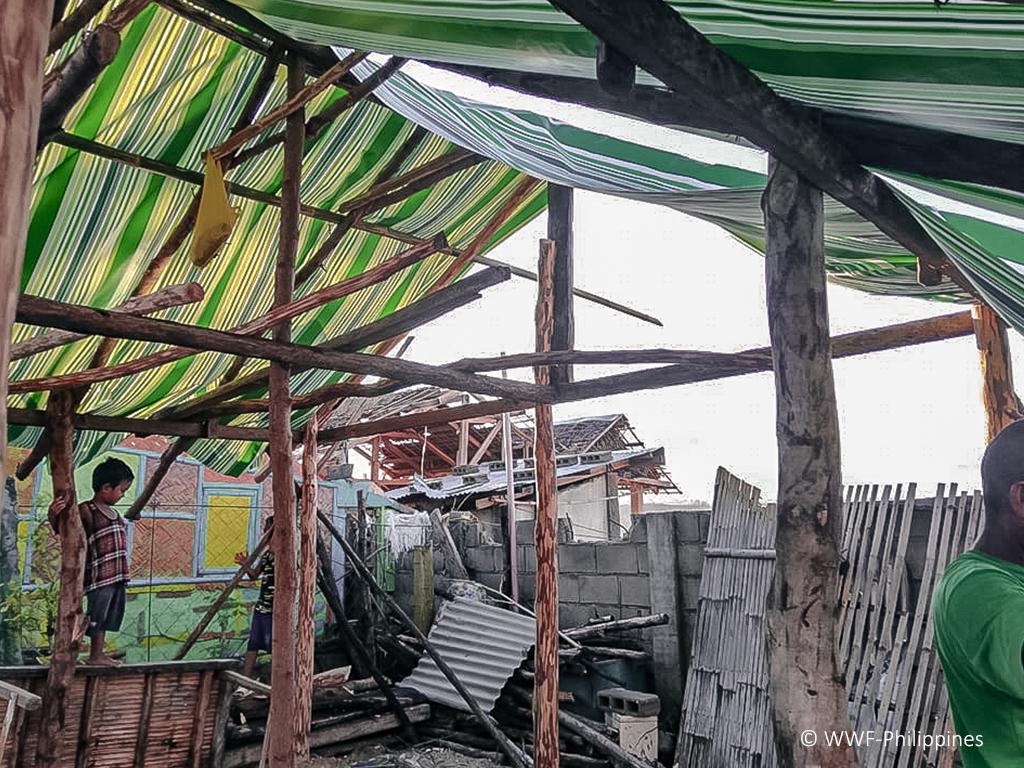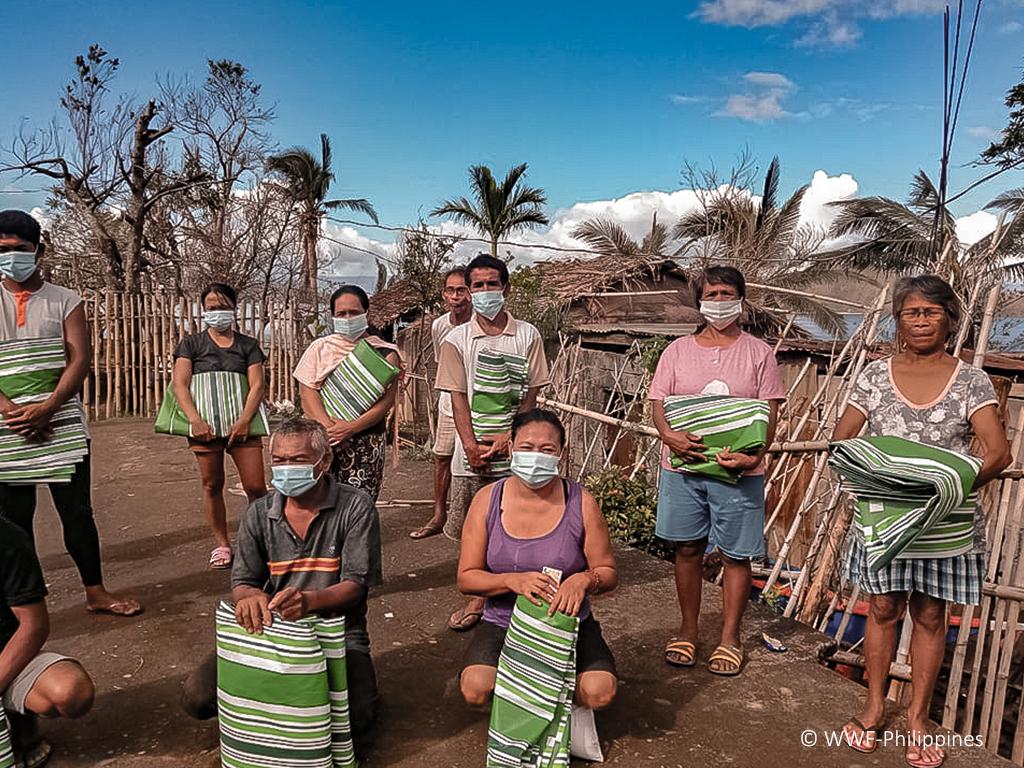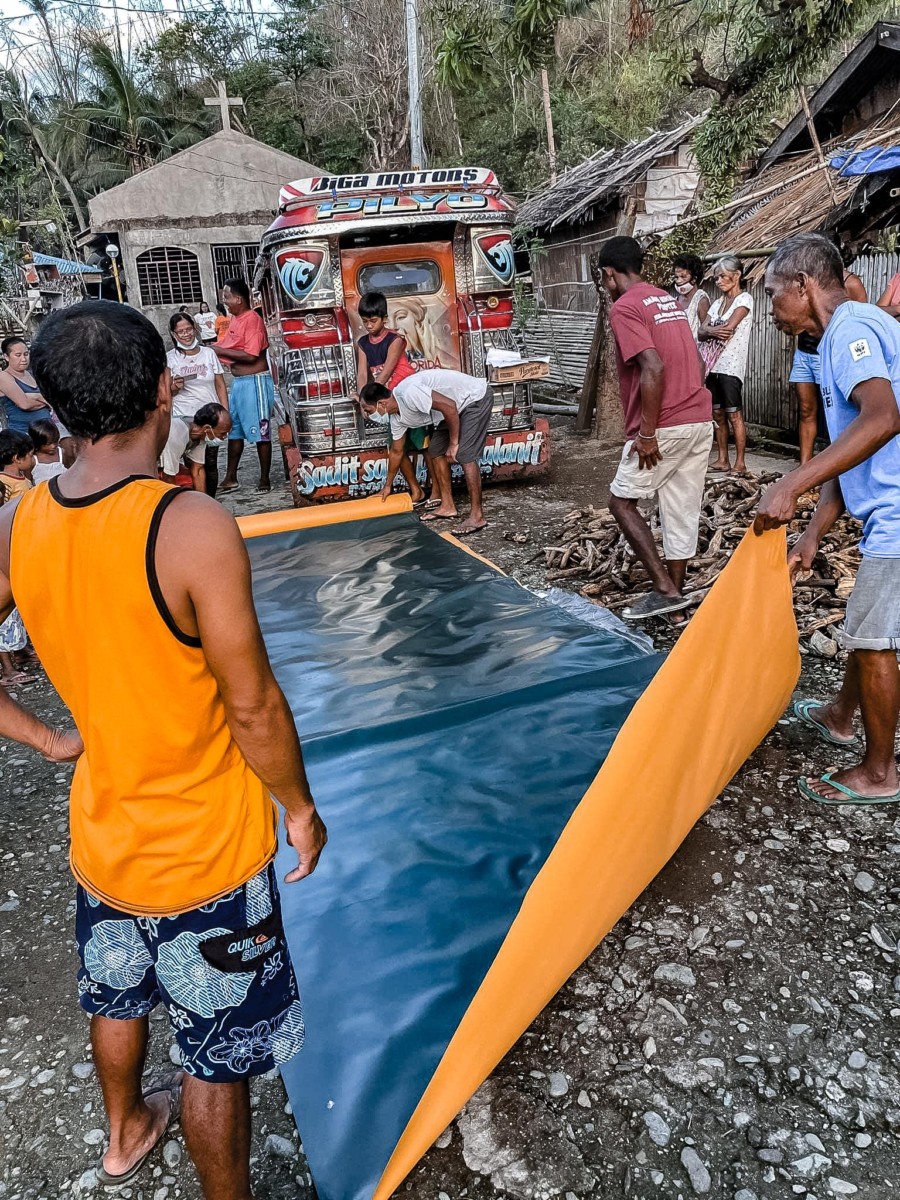Damaged Bicol Fishing Communities Receive Tarpaulin Aid from WWF-Philippines
November 2020

A tarpaulin roof hangs over a damaged home in Bicol. These roofs serve as temporary shelter, keeping families out of the elements as they work on rebuilding their homes and livelihoods. Photograph © WWF-Philippines
150 fisher families have received large strips of tarpaulin from the World Wide Fund for Nature (WWF) Philippines, to serve as short-term aid as they work on repairing their homes and livelihoods.
The relief comes after typhoons Quinta (International Name: Molave), Rolly (International Name: Goni), and Ulysses (International Name: Vamco) swept the region. The storms destroyed many boats and levelled thousands of homes, in a province whose citizens are still reliant on regional fisheries.

Fishers receive their tarpaulin donations. Each strip of tarpaulin serves multiple purposes – as temporary roofing, and as a portable resting place for when they are out at sea or in the fields. Photograph © WWF-Philippines
Much-Needed Shelter
Of all the fishers’ needs, why has WWF-Philippines decided to bring them tarpaulins? For the fishers and their families, each length of tarpaulin goes a long way toward helping them get through the day.
“We here in Bicol are grateful for the help that’s been extended toward our tuna fishing communities here in Lagonoy Gulf. Rolly devastated almost all of the 112 tuna fishing villages we work with. This aid may seem small, but it means a lot for our fishers to have a roof to rest under at the end of the day,” said WWF-Philippines Sustainable Tuna Partnerships Project Manager Joann Binondo.
More than being roofing material for them to repair their homes with, each strip of tarpaulin can be removed and taken out to sea or into the fields as fishers tend to their livelihoods. Should the heat of the day prove too much, or should inclement weather strike them while out at sea or in the fields, fishers can take cover under their tarpaulin as they wait for better weather.
Meant to serve as temporary aid, these tarpaulin roofs serve as relief for fishers and their families as they save up for sturdier materials which they will use to rebuild their homes. In times of inclement weather, they can also fold up their tarpaulin roofs and secure their belongings underneath, to keep their belongings safe from being further damaged.
“We just need a roof over our heads. With a roof over our heads, we can start to rebuild again,” said Tito Consuelo, a fisherman from the municipality of Tiwi, Albay. A seaside community and the site where supertyphoon Goni made landfall on the Bicol mainland, Tiwi suffered severe damage, with most of the residences losing their roofs during the recent storms.

A community in Bicol helps unroll a strip of tarpaulin as WWF-Philippines delivers them relief aid. The tarpaulins will go a long way toward helping damaged communities build back better in the wake of the recent devastating storms. Photograph © WWF-Philippines
Building Back Better
The relief comes as part of WWF-Philippines’ effort to help the fishers of Bicol build back better after the recent calamities. Tarpaulins will be provided in the short term, while in the mid-term, funds and resources will be used to repair and improve the boats that were lost during the storms, so as to allow fishers to return to their livelihoods once again.
“It’s not just about helping these communities survive. What we want is to help them thrive again, in harmony with nature. We want to prop them back on their own two feet, and then help them live as stewards of the environment. That has always been our mission,” added Binondo.
WWF-Philippines has worked with the artisanal fishers of Lagonoy Gulf since 2011. Through workshops and nationwide conferences, WWF-Philippines has supported their livelihoods and lobbied for their rights in front of the national government for almost a decade.
Donate now at https://support.wwf.org.ph/project-silong/ and support the fishers of Bicol!
For more information, please contact:
Ms. Joann Binondo
Sustainable Tuna Partnerships Project Manager
jbinondo@wwf.org.ph
For media arrangements, please contact:
Ms. Pam Luber
Integrated Communications Manager
pluber@wwf.org.ph
Ms. Chezka Guevarra
Public Relations, Media, and Events Assistant Manager
cguevarra@wwf.org.ph
